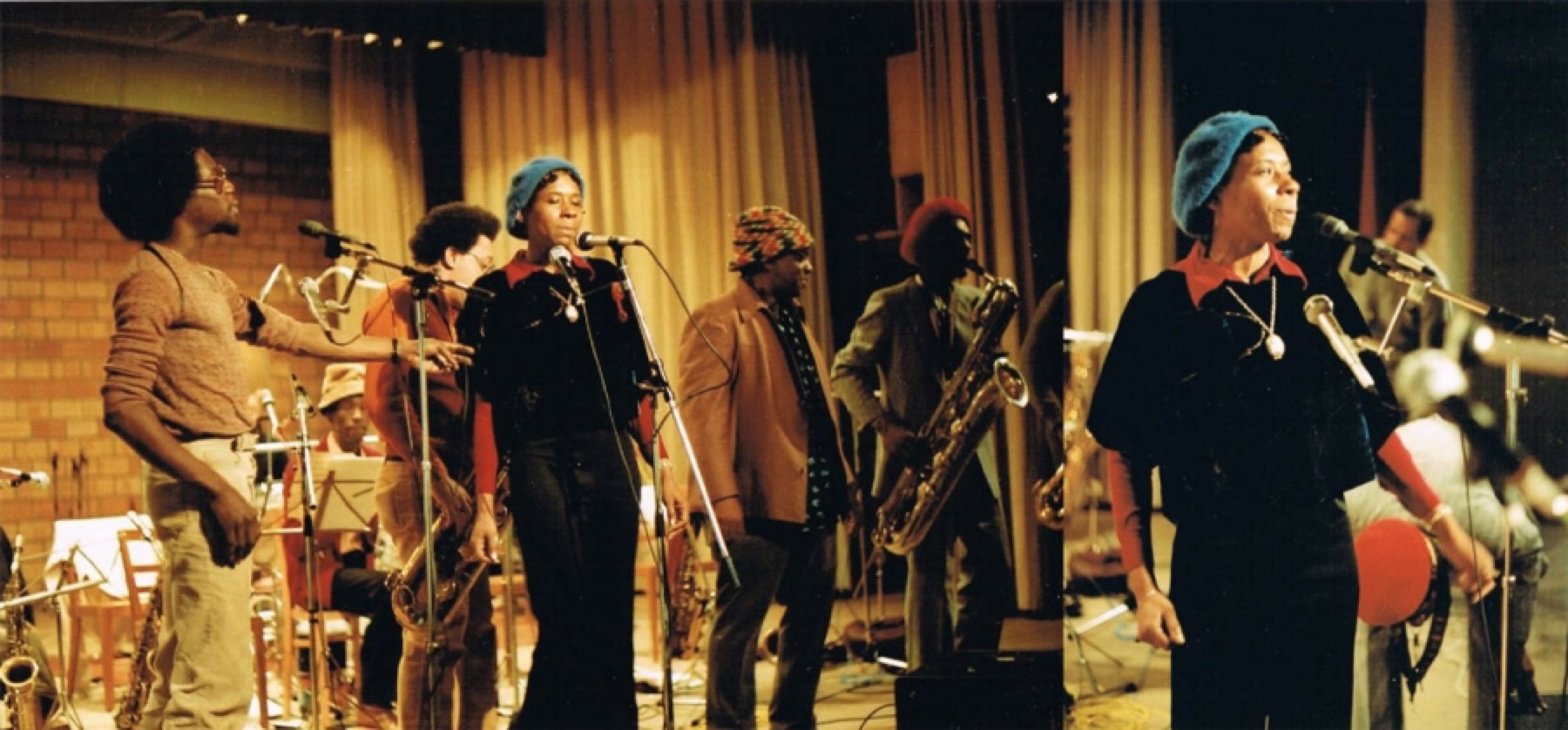
June Tyson with the Sun Ra Arkestra in Willisau, Switzerland, February 1980. Photos by Isio Saba, from the archive of Hat Hut Records Ltd.
“Somebody Else's World“
By Harmony Holiday
2018 Southern Music Issue Sampler featuring North Carolina
Track 22 – “Somebody Else’s World” by Sun Ra & His Arkestra feat. June Tyson
Vocalist June Tyson is the oracle of Sun Ra’s dream vernacular, and her matter-of-fact call at the entrance of “Somebody Else’s World” makes—insists—the dream real, is its sustaining black flesh brought forth by the cut of her utterance. Sun Ra—master jazz pianist, composer, visionary, and astral traveler—is why many jazz listeners entered the Space Age before there was a Space Age. And June Tyson gives vibrational birth to Sun Ra’s visions; with her tone she invents the first accurately pitched black fairy tale or mythocracy for the heliocentric Space Age; she gives us a chance to revel in mythic blackness and make-believe it into reality, or alter-destiny.
Sonny (as Sun Ra was called by some) and June, dueting in their black angel costumes of capes and sequins and spandex, were some of the diaspora’s first images of another kind of black spectacular: one that relentlessly defines itself. Yet while Sun Ra’s sidemen, Marshall Allen and John Gilmore, are still discussed in detail and with reverence among scholars and fans, information on June is cryptic and sparse. She is all but exiled from the kingdom of jazz singers, not traditional enough as a muse to be remembered as a musician. Sun Ra may have stripped his life down to his idiosyncratic mythos, but his female counterpart seemed to become invisible when she moved toward her own myth alongside him.
June was born in Albemarle, North Carolina, in 1936. When she was a lounge singer in Harlem in the 1960s, Sun Ra took to her and started rehearsing her at the legendary Harlem YMCA, inculcating her in his poetry, music, and philosophy. She was the only female member of the Arkestra when she joined, and she mastered the discipline and precision that Sun Ra demanded of all who called themselves members of his band. June was beyond reproach and set a standard that would eventually lead to her position for several years as the band’s road manager. Her nonchalant but urgent performance style made her a mystic equal to Sonny in her refusal to be cajoled out of alignment with her spirit. Eventually, June married the Arkestra’s light and sound designer, Richard Wilkerson. They lived in Harlem, and their family home was a second home for the Philly-based Arkestra whenever they visited New York, which was often. Bandmates slept everywhere from the couch to the kitchen, and June was surrogate mother and sister and muse and colleague to all of these men.
She was also caller and called. The satellites are spinning, another day is dawning, she promises in the pitch of a witness at once tormented and ecstatic to tell us what she sees. Haunted with the promise of a joy that is always elsewhere, of an evasive spacebound trickster relief, June’s voice carries the tone of pure serendipity, of being where you’re meant to be when you’re meant to be there. There’s a hollowing inside of it that adds a layer of drama and suspense without any hysterics. When June recites Sun Ra’s spoken poetry, her pitch lurches in that deep empty like a poised and wavering searchlight, and shines on the language in earnest. Then it seems to shy away from the zeal of that shine with characteristic humility. In that way, June’s phrasing has the personality of a gazelle, of a swift and heartbreakingly graceful runner who cannot leave her post. Sun Ra’s songs are always on the verge of escaping themselves through the portal of her voice. You can feel her sonically glancing over at him as if to assure, I’m ready when you are.
This teaming is one of the most seductive elements in the Arkestra’s music, this mix of ambiguity and certainty, the way June can seem like she’s responding to Sonny’s call when she’s actually the one calling. June forces us to listen on her own terms. She refuses to become somebody else’s idea of what a female singer should be, and she loves herself enough to ward off any self-doubt so that she can tell us where we’ve been, where we’re going, how we can get there—Saturn, Venus, Jupiter, Harlem, home—in the prayerful lanes of her spacious, radiant tone.
June Tyson is our modest Space Jazz hero genius. Her singing smiles at us, and suggests, you can do this too. She proves that the collectivity fostered by improvisation can be healing, and that there is power in being impossible to define and objectify, in being part of an energy larger than oneself: a team. Her safety in the Arkestra’s mythos and songbook is what we all deserve, what we all need from Sun Ra’s unrelenting dream of decolonized planets, cities, and families—habitable alternatives to Earth’s shambles. Her songs are warnings, strident ones, ones that refuse definition, category, and meekness, and entreat us to do the same. If we wake up now, it won’t be too soon.
Return to the North Carolina Issue liner notes.
Order the 20th Southern Music Issue & Sampler featuring North Carolina.


